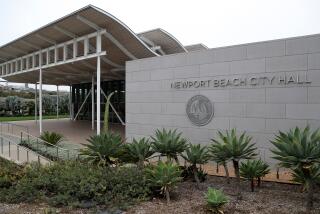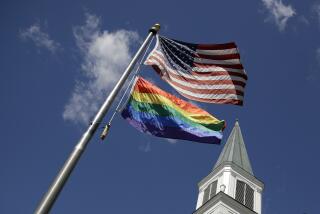ALC Approves Merger With 2 Other Lutheran Denominations
- Share via
American Lutheran Church congregations have approved by an 81% margin a merger with two other Lutheran denominations, officials of the Minneapolis-based church announced Friday.
“The more than four-fifths favorable vote indicates the strength of the ALC desire for union,” said ALC Bishop David W. Preus. “Having voted their best judgment, the congregations will now pull together, worshiping and serving God in and through the Evangelical Lutheran Church in America.” The new church body comes into being Jan. 1, 1988.
Of the approximately 4,950 affiliated congregations, 4,660 valid ballots were received in Minneapolis--3,752 voting yes, 863 voting no and 45 sending in blank ballots, which were counted as abstentions.
The only remaining question is how many congregations that voted against the merger will vote now to drop their affiliation.
The Rev. James Minor, a St. Paul, Minn., pastor and leader of the anti-merger Assn. of American Lutheran Churches, said Friday that the 908 churches “that did not vote yes was double what we expected. My ‘guesstimate’ is that 400 to 500 churches will decide to join another Lutheran church or go independent during the coming year to two or three years.”
A Southern California leader said that 20 to 25 churches out of about 150 in Southern California had let it be known before this week that they voted against the merger.
The objections, according to one spokesman, the Rev. D. R. Lindberg of Waterloo, Iowa, are mostly that many conservative Lutherans feel the new church lacks “a strong statement on the authority of Scripture and the Lutheran confessions, or creedal statements,” and dilutes the ALC’s strong wording on the authority of the local churches.
The new church will have about 5.3 million members, making it the fourth-largest U.S. Protestant denomination, behind the Southern Baptists, Methodists and National Baptists and ahead of the 3-million-member Presbyterian Church (U.S.A.). It brings together the 2.91-million-member Lutheran Church in America, the 2.33-million-member ALC and 110,000-member Assn. of Evangelical Lutheran Churches, which formed after breaking away a decade ago from the highly conservative Lutheran Church-Missouri Synod.
The only remaining formality is a second vote by the LCA convention April 29 in Columbus, Ohio. The new denomination’s constituting convention begins the next day and will hold elections for a presiding bishop and other officers.
Last Aug. 29, concurrent national conventions of the three church bodies voted in favor of merger, but the ALC constitution required that two-thirds of its local churches also approve. Congregations had six months until last Sunday to meet and vote on the merger.
Bishops of merging churches have said the coming together into one mainline church will give Lutherans more visibility in the nation and more influence on social and moral issues, among other benefits.
“It was time to do it,” said Pastor Eugene R. Holtz of Clairemont Lutheran Church in San Diego, referring to the merger. Holtz noted that the ALC already had been working closely with the more liberal LCA and the young AELC when the three churches voted in 1982 to work toward union.
“We had close to 100% approval when we met and voted last October,” Holtz said. One of the largest ALC churches in California with 1,200 adult members, Clairemont Lutheran Church only drew between 100 and 200 members for the vote. Several ministers said that it is usual for much less than half a church’s membership to turn out for congregational matters.
Another large ALC church in Southern California, Trinity Lutheran Church in San Gabriel, voted overwhelmingly against the merger because it opposed the time and effort consumed by the merger process itself, according to Pastor Walter Mees.
Mees said he was a witness to a four-way merger in 1930 and was involved in the ALC’s previous merger in 1960. “I don’t like to see another 20 years lost just putting the pieces together. The day is too critical for the ministry of the church. I feel that we are in the ‘latter days’ and that the Lord might return sooner than most people think,” Mees said.
As to whether Trinity Lutheran Church, which has 1,300 baptized members and 987 adult members, will cut its denominational ties, Mees said that no decisions have been made. “We are studying all possibilities,” he said.
Similarly, the Rev. Robert Dennis, pastor of University Lutheran Church in Long Beach, which voted against the merger, said his congregation has not decided whether to join the new church and he has not heard of any other anti-merger congregation that has committed itself to leaving.
“It is never fun to be in the minority and I have regard for people who have opinions different from my own,” Dennis said. “It’s a difficult decision.”
Pastor Orville Hiepler of Camarillo Lutheran Church, which opposed the merger, said he believes that in merger negotiations the ALC “left us” by not insisting on a conservative statement about biblical authority. “As a result of that, its position on social issues such as homosexuality and abortion is watered down,” Hiepler said.
In a recent column for the five-state South Pacific District newsletter, ALC Bishop Nelson Trout of Woodland Hills wrote that “God is putting us together in a new way” in the Evangelical Lutheran Church. But, speaking obliquely to merger opposition, Trout wrote that some church people are not only uncomfortable with the new but also “preoccupied with that which is old just because it is old.”
The Rev. John Hanisch, one of the ministers at the 1,000-member Red Hill Lutheran Church in Tustin, said his congregation is “very conservative and originally had some qualms” about the merger but in the end approved it by a large margin.
A possible legal challenge to the ALC’s part in the merger may arise. A Brentwood attorney who opposes the merger said this week that he hopes to seek a federal court injunction “to stop or delay the constituting convention.”
The attorney, Lawrence Hanna, said in an interview that congregations typically polled only the members who showed up for a meeting. Hanna contends that California law requires a quorum, or a majority of the membership, to vote on the matter.
He said his congregation, Valley Lutheran Church in North Hollywood, favored the merger by a margin of two votes, but that a majority of the 155 confirmed members were not present. The Rev. Gregory Brandvold, the pastor, said that about 45 people attended, which was “better than average” for a congregational meeting.
Herb David, ALC director of communications, said denominational officers have withheld comment on any potential legal objections pending the actual filing of any lawsuits.
More to Read
Sign up for Essential California
The most important California stories and recommendations in your inbox every morning.
You may occasionally receive promotional content from the Los Angeles Times.













